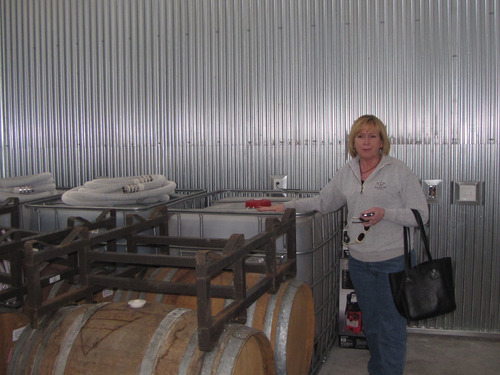This is an archived article that was published on sltrib.com in 2012, and information in the article may be outdated. It is provided only for personal research purposes and may not be reprinted.
Cedar City • A new Utah winery is on the verge of corking its first bottle in Cedar City.
"It's been a long time coming, and we're looking forward to it," said Doug McComb, owner of the Iron Gate Winery label. McComb, a human resource manager for a resort in Las Vegas, has dabbled in winemaking there.
McComb said he hopes to secure permission soon from the Utah Department of Alcohol and Beverage Control to first blend and bottle wines, and eventually grow grapes and produce them, at his winery at 100 N. 200 West in Cedar City. He plans to sell the wines at a nearby package store that still needs to be built on a vacant lot.
McComb said 5 million tourists a year pass through southern Utah, some of whom stop at the Utah Shakespeare Festival. He believes some of those visitors would like to sample his special blends, which will sell from $10 to $30 a bottle.
Grapes for his wine will not be grown in Utah initially, but imported from Washington state and California and blended at his winery. He hopes to open the winery for tastings by June.
By this fall, McComb said he plans to have his own wine press and other equipment in place to begin processing harvested grapes from the West Coast. To meet projected demand, he also plans to continue blending and bottling wines produced elsewhere.
Eventually, he hopes to produce 2,500 cases of wine a year.
McComb plans to offer a selection of white wines, such as chardonnay, Reisling, Rausanne and Viognier, and reds that include cabernet, Tempranillo, Syrah and a late harvest Zinfandel as a dessert wine. He said he is advertising for farmers in the Cedar City area to grow grapes for his wines.
Operations manager Laura McBride said the winery will include a tasting room that also offers bread, cheese and crackers, plus an outdoor tasting area complete with an "aromatic garden" to enhance the sensory experience of the wine.
The winery is being built on property leased from the Iron Gate Inn, one of Cedar City's first bed-and-breakfast inns. The owners believe a winery will be a draw for visitors to the Shakespeare Festival and other tourists, many of them from Europe, who pass through the region year-round on their way to Utah's national parks.
Susan Wooten, who owns the nine-room inn with her husband, said the winery will be a welcome amenity.
"In the offseason when we see a lot of European tourists, it will be a great opportunity for them to relax in the afternoon and stay here instead of zipping off every day," she said. "A winery and B-and-B are an excellent bridge."
Vickie Ashby, spokeswoman with the Department of Alcohol and Beverage Control, said McComb needs to build a separate package store from which to sell the wine because the production facility is within 200 feet of a church and Utah law prohibits alcohol from being sold within that proximity.
"The building must be constructed before the proximity measurements can be taken," said Ashby.
She said if the structure is approved, a public hearing will be held for input on the operation. Ashby said nine licenses have been issued to wineries in Utah, including two to Iron Gate.
McComb said he has not encountered any major hurdles in dealing with the state or city and expects he will soon be in business.
Iron Gate wouldn't be southwestern Utah's first winery, however.
In an article titled "Dixie Wine" published in Sunstone Magazine, Dennis Lancaster wrote about the first wine industry that flourished in Utah more than a century ago.
In the 1860s, when then-Mormon Church president Brigham Young sent settlers to Washington County, one of their mandates was to produce wine from grapes that grew well in the sandy soil, according to Lancaster. At the time, either water or wine was allowed for use in the sacrament.
Lancaster reported that church members in communities along the Virgin River nearly all took sacrament of "Dixie Wine" produced in Toquerville. John Naegle was said to be the best of the winemakers, marketing his creation under the name "Nail's Best."
"It should be emphasized that the Word of Wisdom, as we know it today, was not considered binding upon the Church until the October 1880 general conference of the Church, when the Pearl of Great Price and Book of Doctrine and Covenants were canonized. Until that point, the people of Dixie considered the Word of Wisdom a good piece of advice, but not a commandment," Lancaster wrote.
The Word of Wisdom, part of the Doctrine and Covenants, was not immediately heeded by church members in Utah's southwest, according to Lancaster's article.
Winemaking in the region eventually withered, and not just from church pressure. There were also economic reasons. Greedy winemakers began selling wine made from bad grapes, or wine that wasn't properly aged, and customers began to buy elsewhere, Lancaster wrote. The railroad allowed better-quality California wine to be imported. And the closing of the Silver Reef Mine north of St. George in the 1880s eliminated a major market. Farmers began pulling up their grapes.
Cedar City Manager Rick Holman said the city is just waiting for approval of the final construction before signing off on the project.
"Obviously they have a product their clientele will enjoy," said Holman. "It could enhance experience in [Cedar City]. They have put a lot of work into it, and I hope it works out."





